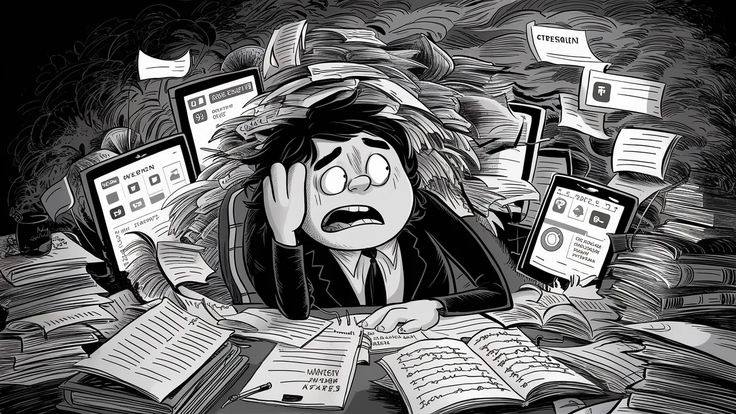Stress has become an inseparable part of modern life. From tight deadlines at work to personal responsibilities and financial pressures, almost everyone experiences moments of feeling overwhelmed. While a certain level of stress can sometimes push us to perform better or stay alert, excessive or poorly managed stress often does the opposite. It drains energy, clouds judgment, and creates a cycle where even simple tasks feel heavier than they actually are.
The link between stress and success is more complicated than it seems. On the surface, we often associate hard work and high pressure with achievement. Many people even believe that being under constant stress is the price of success. However, research consistently shows that prolonged stress undermines productivity, creativity, and decision-making skills. Instead of driving us toward our goals, it often pulls us further away from them.
This article explores the hidden battle of stress vs. success. It explains how stress interferes with clear thinking and leads to wrong decisions, both in personal and professional life. More importantly, it provides practical strategies to regain focus, manage stress effectively, and make wiser choices under pressure. Success is not about working harder under stress but about working smarter with a clear, calm mind.
Understanding Stress and Its Impact
Stress is often described as the body’s natural response to challenging or demanding situations. Scientifically, it is both a physiological and psychological reaction. On the physiological side, stress activates the “fight-or-flight” response, releasing hormones such as cortisol and adrenaline. These hormones increase heart rate, sharpen senses, and prepare the body to respond quickly. Psychologically, stress manifests as feelings of worry, tension, or being overwhelmed, which can influence emotions, behavior, and thought processes.
Not all stress is harmful. Experts distinguish between eustress—positive stress—and distress—negative stress. Eustress occurs when stress is short-term and motivating. For example, a student preparing for an exam may feel a rush of adrenaline that boosts focus and performance. Similarly, an athlete may experience pre-game nerves that sharpen reflexes and encourage peak performance. In these cases, stress serves as a useful driver for productivity and growth.
On the other hand, distress arises when stress is prolonged, excessive, or poorly managed. Distress drains energy, reduces efficiency, and weakens the ability to cope with challenges. Unlike eustress, which motivates, distress overwhelms. Instead of sharpening focus, it clouds the mind, leading to poor judgment and mental fatigue.
The brain is particularly vulnerable to chronic stress. High levels of cortisol over extended periods impair the hippocampus, a region critical for memory and learning. Stress also disrupts the prefrontal cortex, which is responsible for decision-making, problem-solving, and self-control. This explains why people under stress often struggle to concentrate, forget important details, or act impulsively. In simple terms, stress hijacks the brain’s clarity and replaces it with chaos.
Real-life examples highlight this impact clearly. A student who panics during an exam may forget answers they studied well, not because they didn’t learn, but because stress blocks recall. A manager overwhelmed by deadlines might rush decisions, approving flawed strategies that harm the company in the long run. Likewise, an athlete under extreme pressure may choke during competition, missing opportunities despite months of preparation.
Understanding these dynamics is crucial: stress is not just an emotional burden but a biological force that influences how we think, act, and ultimately succeed. Recognizing the difference between helpful and harmful stress is the first step toward managing it effectively and preventing it from derailing important decisions.
Stress vs. Success: The Hidden Battle
Success, whether personal or professional, is often associated with clarity, resilience, and the ability to make sound decisions. However, stress introduces a silent opponent in this journey. While many people push themselves under pressure believing it will accelerate progress, the reality is often the opposite: unmanaged stress sabotages success from within.
One of the main reasons stress hinders success is its effect on decision-making. Under pressure, the brain shifts into survival mode, relying more on instinct than rational analysis. Instead of calmly weighing options, individuals under stress tend to act quickly, sometimes impulsively, in an effort to “fix” the situation. This reactive mindset often leads to flawed judgments. For instance, a CEO facing a sudden market downturn may make a hasty decision—such as cutting essential staff or resources—without fully evaluating long-term consequences. While the choice may seem practical in the moment, it can create bigger problems down the line.
Athletes provide another vivid example. In sports, success often hinges on mental composure as much as physical skill. A tennis player, for example, may dominate practice sessions but crumble during a championship match due to overwhelming pressure. The stress distorts focus, turning well-rehearsed movements into mistakes. Instead of performing at their peak, the athlete succumbs to anxiety, showing how stress transforms preparation into failure.
The same pattern is visible in everyday life. A young professional juggling multiple deadlines may find themselves paralyzed, unable to prioritize tasks effectively. Instead of focusing on high-impact projects, they may waste time on small details, driven by stress-induced confusion. Similarly, students under immense academic pressure might resort to unhealthy shortcuts, such as cramming or even cheating, rather than building sustainable learning habits.
Ultimately, success requires more than effort—it requires a clear mind capable of strategic thought. Stress clouds this clarity, creating mental fog that leads to hesitation, overreaction, or poor choices. Without proper stress management, even the most talented individuals risk undermining their own goals.
The hidden battle between stress and success is not about avoiding challenges altogether, but about learning how to face them without letting pressure dominate. True achievement comes when individuals maintain composure, preserve focus, and make decisions not from a place of panic, but from clarity and confidence.
Common Wrong Decisions Under Stress
Stress does not only drain energy—it often pushes people toward poor decisions that can have lasting consequences. When the mind is overwhelmed, rational thinking takes a back seat, and emotional impulses begin to drive choices. This explains why many individuals regret decisions made during stressful moments.
One common example is impulsive spending. After a tough day or during periods of high anxiety, people may turn to shopping as a temporary relief mechanism. Buying new clothes, gadgets, or even unnecessary luxuries creates a short-lived sense of happiness. However, once the initial excitement fades, they are left with financial strain and guilt. Stress-driven spending is not about need but about emotional escape, making it one of the most common mistakes under pressure
Another frequent wrong decision is entering or staying in toxic relationships. Stress often makes individuals crave emotional support and validation. In this vulnerable state, they may tolerate harmful behavior or rush into relationships that do not serve their well-being. Instead of carefully assessing compatibility and long-term value, the decision is guided by the immediate desire to feel secure. Unfortunately, such choices usually lead to more stress, creating a vicious cycle.
Work-related decisions also suffer under stress. For example, employees who feel overwhelmed by workplace pressure might quit a job impulsively, even when it holds long-term opportunities. Others may give up on ambitious projects or personal goals at the first major obstacle, mistaking temporary challenges for permanent defeat. In both cases, stress blurs the distinction between short-term discomfort and long-term growth, causing premature exits that sabotage future success.
Why do these decisions happen? The science points to the brain’s response under pressure. Stress activates the amygdala—the brain’s emotional center—while reducing activity in the prefrontal cortex, which handles logic and planning. This imbalance explains why people under stress often choose quick emotional relief over rational long-term thinking. In other words, stress narrows perspective: the focus shifts to immediate survival instead of strategic decision-making.
Recognizing these patterns is essential. By understanding how stress distorts judgment, individuals can pause before making life-altering choices and seek clarity instead of reacting impulsively. Avoiding these common pitfalls is a critical step toward turning stress from a destructive force into a manageable challenge.
Regaining Focus: Practical Stress Management Strategies
Managing stress effectively is not about eliminating challenges from life but about learning how to approach them with clarity and resilience. By adopting the right strategies, individuals can transform stress from a destructive force into a manageable companion. Below are practical methods to regain focus and maintain balance.
1. Mindfulness & Meditation
Mindfulness involves being fully present in the moment, observing thoughts and emotions without judgment. When practiced regularly, it helps quiet the mental noise created by stress. Meditation techniques, such as focusing on the breath or practicing guided relaxation, lower cortisol levels and calm the nervous system. Even 10 minutes a day can improve concentration, reduce anxiety, and restore mental clarity, allowing better decision-making under pressure.
2. Time Management
Poorly managed time is one of the biggest triggers of stress. When deadlines pile up, people often feel trapped in an endless cycle of rushing. Effective time management—through tools like to-do lists, digital planners, or prioritization frameworks such as the Eisenhower Matrix—helps break tasks into manageable parts. By planning ahead and focusing on what truly matters, individuals prevent the chaos of last-minute pressure and regain control over their schedules.
3. Exercise & Nutrition
Physical activity is a natural stress reliever. Exercise releases endorphins, the body’s “feel-good” chemicals, which improve mood and counteract anxiety. Simple activities such as walking, running, or yoga can reduce tension and improve focus. Nutrition also plays a critical role: a diet rich in whole foods, fruits, vegetables, and lean proteins stabilizes energy levels, while excessive caffeine, sugar, or processed foods often worsen stress symptoms. Fueling the body properly means the brain has the resources to stay sharp under pressure.
4. Sleep & Recovery
Lack of sleep is both a cause and a consequence of stress. When the body is deprived of rest, concentration, memory, and emotional stability all decline. Quality sleep—around 7 to 9 hours per night—allows the brain to reset and process information more effectively. Establishing a bedtime routine, avoiding screens before sleep, and creating a calming environment all support recovery. Prioritizing rest is not a luxury but a necessity for resilience and wise decision-making.
5. Breathing Techniques
Quick stress relief can often be achieved through controlled breathing exercises. Practices such as “box breathing” (inhale for 4 seconds, hold for 4, exhale for 4, hold for 4) or diaphragmatic breathing signal the nervous system to relax. These techniques are especially useful in high-pressure moments—before a big meeting, during conflict, or in the middle of exam stress—when immediate calm is needed.
6. Setting Priorities
One major source of stress is overcommitment. Many people struggle to say “no,” accepting tasks that drain energy and time. Learning to prioritize and delegate reduces unnecessary pressure. By focusing only on what aligns with long-term goals, individuals conserve mental energy for meaningful activities. Clear boundaries protect against burnout and free up space for thoughtful decision-making.
7. Seeking Support
Humans are social beings, and support networks are vital in times of stress. Talking to trusted friends, family, or mentors can provide perspective and emotional relief. In more serious cases, professional help through therapy or counseling offers structured guidance for managing anxiety and building coping strategies. Acknowledging the need for support is not weakness—it is a sign of strength and a proactive step toward balance.
Incorporating these strategies into daily life does more than reduce stress—it cultivates resilience, improves focus, and creates the conditions necessary for success.
Stress may be unavoidable, but with the right tools, it does not have to dictate decisions or derail ambitions.
How to Make Wise Choices Under Pressure
Making decisions under pressure is one of the most difficult challenges people face. Stress clouds judgment, narrows focus, and pushes individuals toward quick fixes rather than thoughtful solutions. However, adopting a structured and mindful approach can transform decision-making, even in high-stress situations. Below are practical steps that help maintain clarity when the pressure is high.
1. Pause Before Acting
The most important step in stressful situations is to stop. Instead of rushing into a choice, take a brief pause to breathe and calm down. This momentary break allows the brain to shift out of panic mode and gives space for rational thinking. Often, the worst mistakes come from reacting too quickly without considering the bigger picture
2. Write Down Pros and Cons
When emotions are high, thoughts can feel scattered. Writing down the advantages and disadvantages of each option makes abstract concerns tangible. This simple practice organizes the mind, highlights blind spots, and brings clarity to what truly matters. A student deciding whether to drop a difficult course, for example, may discover that the long-term benefits of persistence outweigh the temporary stress.
3. Consult a Trusted Person
Stress often makes people feel isolated, as though they must solve everything alone. In reality, discussing decisions with someone trustworthy provides valuable perspective. A mentor, friend, or colleague may see opportunities or risks that are invisible to someone trapped in a stressed state. This external viewpoint can prevent rash actions and encourage more balanced judgment.
4. Practice Detached Thinking
One effective method for decision-making under stress is to step outside the situation mentally, as if advising someone else. This “detached thinking” removes some of the emotional charge, allowing decisions to be viewed more objectively. By asking, “What would I recommend if a friend were in this situation?”, individuals create distance from immediate emotions and approach the problem with greater logic.
Together, these strategies create a methodical approach that counters the impulsive tendencies triggered by stress. Instead of letting emotions dictate choices, structured thinking reintroduces clarity and control. This systematic process not only reduces the likelihood of regret but also builds confidence in future decision-making.
Ultimately, wise choices under pressure are not about perfection—they are about creating enough space between emotion and action to allow reason to prevail. By slowing down, organizing thoughts, seeking support, and stepping back, individuals can turn high-stress moments into opportunities for growth and success.
Long-Term Habits for Stress-Free Success
While quick stress-management techniques are useful in urgent situations, long-term success requires building habits that prevent stress from accumulating in the first place. A calm mindset is not achieved overnight; it is the result of consistent practices that train the mind and body to remain steady even in the face of challenges.
The foundation of stress-free success lies in cultivating a calm and resilient mindset. This involves shifting from a reactive approach—where stress dictates responses—to a proactive one, where challenges are anticipated and managed before they become overwhelming. Practicing gratitude, journaling, or engaging in reflective thinking helps individuals stay grounded and maintain perspective on what truly matters.
Daily routines also play a vital role. Incorporating simple practices such as morning exercise, balanced meals, and short mindfulness breaks during the day keeps stress levels manageable. Even dedicating a few minutes to deep breathing or stretching between tasks can reset energy and sharpen focus. Consistency is more important than intensity—small, regular habits accumulate into lasting resilience.
Equally important is setting boundaries. Protecting personal time, limiting unnecessary commitments, and ensuring adequate rest prevent burnout. Success is not measured by constant activity but by the ability to sustain energy and creativity over time. By honoring balance, individuals avoid the trap of overwork and maintain motivation for the long run.
These habits not only reduce stress but also enhance sustainable success. A calm, focused mind makes smarter decisions, builds stronger relationships, and adapts better to change. Instead of riding waves of burnout followed by recovery, individuals who integrate stress-reducing routines into their lifestyle experience steady progress.
In essence, long-term success is less about working harder and more about working steadily with clarity. By nurturing daily practices that promote calmness and resilience, people create a strong foundation where stress no longer controls the journey but becomes a manageable part of it.
Stress is an unavoidable part of modern life, but it does not have to dictate the quality of our decisions or the direction of our success. As explored throughout this article, unmanaged stress clouds judgment, triggers impulsive choices, and creates barriers to personal and professional growth. From impulsive spending to rushed career decisions, the effects of stress can be costly when left unchecked.
Yet, the story does not end there. By practicing mindfulness, managing time wisely, exercising regularly, prioritizing rest, and seeking support when needed, it is possible to regain focus and think clearly even under pressure. Structured strategies such as pausing before making decisions, writing down pros and cons, or practicing detached thinking transform moments of tension into opportunities for better judgment.
Long-term habits—like cultivating a calm mindset, setting healthy routines, and protecting balance—create resilience that sustains success over time. True achievement comes not from pushing through stress blindly, but from learning how to manage it with intention.
Stress is, and always will be, a part of life. But the key lies in how we respond to it. Mastering stress management is not just about reducing pressure; it is about unlocking the clarity, focus, and wisdom necessary for real, lasting success.
👉 Related topics: When Doing Nothing Feels Like Failing






